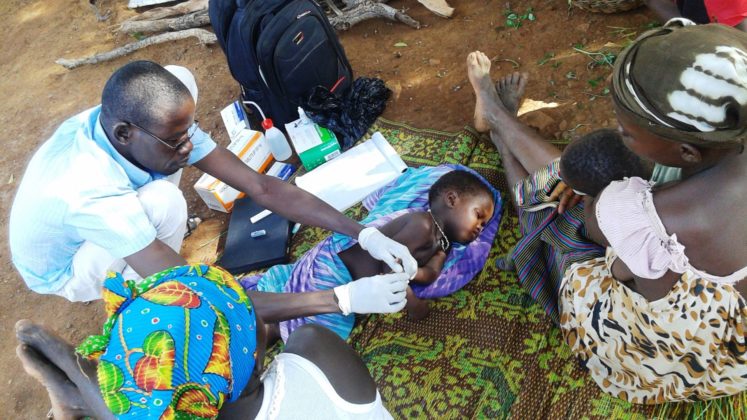
A medical team in western Africa tests the blood of a feverish child for the presence of parasites that cause malaria. Photo: Brian Foy/CSU Arthropod-borne and Infectious Diseases Laboratory
CNN carried an alarming headline this spring: “Seven reasons we’re at more risk than ever of a global pandemic,” it said. The news story reported that public health experts believe the world is at greater risk than ever of large-scale, devastating outbreaks of infectious disease.
Think Ebola, SARS and Zika virus.
Mass media outlets aren’t the only ones taking note. The World Economic Forum identified global disease outbreaks among the planet’s most concerning risks in its Global Risks 2016 report.

Colorado State University scientists who research infectious disease hope to prepare for future outbreaks by fostering collaboration among scientists in industry, research institutions and government agencies. That’s the aim of Innovation in Infectious Disease Research: Challenges & Opportunities, a symposium hosted by Colorado State University June 7-9 at the University Center for the Arts, 1400 Remington St.
Speakers include Dr. Michael Kurilla, director of the Office of Biodefense Research Resources and Translational Research for the National Institute of Allergy and Infectious Diseases. Nicole Archambeau, assistant professor in the CSU Department of History, will open the symposium with a discussion of the role of disease and treatments for disease throughout history.
Sessions will cover vaccine and biologics manufacturing, challenges to understanding and controlling vector-borne diseases, biomedical engineering in industry and advancing research into methods of diagnostic, therapeutic and vaccine production, among other topics.
Registration is open until May 15 and is free for CSU faculty, students, post-doctoral researchers and staff.
Echoing the CNN story, Ray Goodrich, executive director of CSU’s Infectious Disease Research Center, said that people are more at risk for the emergence of new infectious agents now than at any other time in history.
“We’ve seen cases of outbreaks of disease ranging from Ebola to chikungunya, dengue and most recently Zika virus, which have significantly affected large populations in various parts of the world,” he said.
Goodrich, also a professor in the Department of Microbiology, Immunology, and Pathology, said that people are more at risk due to the increase in global travel and changes in our living conditions, such as increased habitation in areas that bring human and animal populations into closer contact. In many of these cases, wild animal populations act as a reservoir for diseases that can affect humans as well. The increased co-habitation only increases the risk of transmission.
“The signals and patterns that we see relative to disease outbreaks suggest that we need to be prepared for more of them to happen and to be ready to prevent their spread or counteract them when they do occur,” he said.
An additional goal for the symposium is to increase communication, dialogue and brainstorming among participants. “We hope to create new collaborations that help us to advance the goal of developing technologies that address infectious disease and improve public health,” he said.
CSU a leader in infectious diseases research
Innovation in Infectious Disease Research will highlight CSU research, and the university’s broad capabilities and strengths that exist to tackle infectious diseases.
“We span activities that support more effective, integrated infectious disease outbreak response, from enabling discovery, to developing diagnostics, therapeutics, and vaccines for a healthier world,” said Alan Rudolph, vice president for research.
Colorado State is home to the largest contingent of tuberculosis researchers in the country. The university has also been at the forefront of Zika virus research and is renowned for its breakthroughs on chronic wasting disease, a contagious neurological disease that affects deer, elk and moose.
The university oversees the Rocky Mountain Regional Biocontainment Laboratory, one of 13 such labs in the United States.
In addition, BioMARC is a nonprofit Contract Manufacturing Service Unit owned and operated by the university and created to produce biopharmaceutical products for non-clinical, clinical, and commercial use under Biosafety Level 3 and Biosafety Level 2 containment and Select Agent biosecurity conditions.
The BioMARC facility is housed in the Infectious Disease Research Center which provides a secure facility for university investigators, government scientists, and industry representatives to collaboratively research the basic biology, biochemistry, molecular biology, and epidemiology of bacteria and viruses that cause human and animal diseases.
